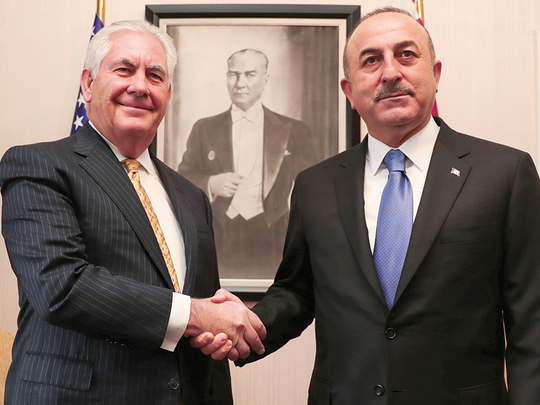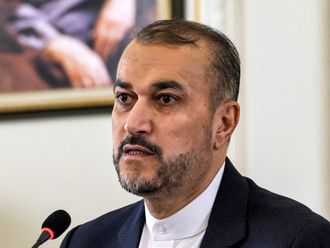
Ankara: The United States and Turkey pulled back from the brink of crisis on Friday, agreeing to normalise badly strained relations over Syria and other issues that had threatened the NATO allies’ longstanding ties.
However, details of the rapprochement were vague as the two sides agreed in principle only to form working groups that will begin meeting within the month to examine points of contention and try to resolve them.
US Secretary of State Rex Tillerson and Turkish Foreign Minister Mevlut Cavusoglu announced the creation of new “mechanisms” to improve the relationship, starting with the question of American support for Kurdish rebels in northern Syria, after talks in Ankara.
Those talks followed a lengthy meeting among Turkish President Recep Tayyip Erdogan, Cavusoglu and Tillerson late Thursday at which a broad range of disagreements were covered. In addition to Syria, those included Ankara’s complaints against a US-based Turkish cleric whom Erdogan accuses of fomenting a failed 2016 coup, and US concerns about the state of Turkey’s democracy.
“We brought forward proposals on how we can address all of the critical issues that are standing between our countries,” Tillerson said during a joint news conference with his Turkish counterpart. He said that joint working groups would take up specifics issues including troop deployments to address Turkish border security concerns.
Turkey is riled over Washington’s support to the YPG - the top US ally in the fight against Daesh. Turkey considers it a “terrorist” group linked to Kurdish rebels fighting inside Turkey. Ties have also sunk to an all-time low over, what Turkey perceives to be Washington’s reluctance to extradite a US-based cleric Fethullah Gulen and the trial in the United States against a banker accused of helping Iran evade sanctions.
The US for its part is angered by the detention of US citizens and of Turkish employees of US consulates in Turkey on alleged terror charges.
“We find ourselves at a bit of a crisis point in the relationship,” Tillerson said, at a joint news conference with Cavusoglu, stressing the importance of ties between two countries that were once close.
“Ours is not an alliance of convenience. It is a time-tested alliance built on mutual respect, “Tillerson said. “We’re going to work together moving forward.”
Tillerson said the first committee would begin working in mid-March and deal with the issue of the town of Manbij, held by the US-backed Syrian Kurdish militia and where the United States has a military presence.
Turkey has long pressed the United States to ensure that the YPG leave Manbij and has threatened to extend an offensive to drive Syrian Kurds from a border enclave to that region.
“Our relations were at a critical turning point,” Cavusoglu said. “We were either going to correct this or it was going to take a turn for the worse.
Cavusoglu repeated that promises made by the previous US administration about the YPG moving to the east of the river Euphrates were broken.
Tillerson said the United States was open to hearing more “evidence” against the organisation.
As the talks got underway, dozens of Turkish demonstrators marched to the building where the meeting took place, waving Turkish flags, to protest US support to Syrian Kurdish militia, known as the People’s Protection Units, or YPG.
In Brussels on Thursday, US Defense Secretary Jim Mattis said the United States and Turkey are in open dialogue about their differences. Turkey’s defense minister was among those he met at NATO.
“I believe we are finding common ground and there are areas of uncommon ground where sometimes war just gives you bad alternatives to choose from,” Mattis said.
The US considers the Syrian Kurdish fighters the most effective fighting force in the battle to defeat Daesh in Syria, and this week offered a budget plan that would send them the bulk of $550 million in new assistance.
Turkey’s military campaign against Kurds in northern Syria has alarmed the US leaders who have watched as the fighting has sapped energy from the fight against remaining Daesh strongholds.












